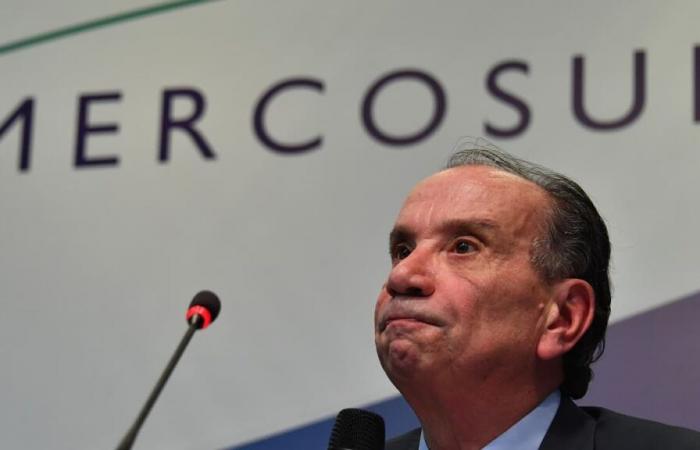
Paris opposes the adoption of this treaty which intends to eliminate the majority of customs duties between the European Union and five countries including Brazil and Argentina.
A quarter of a century of gestation for a forceps adoption… or a funeral? A few days before a G20 and a few weeks before a meeting of the five Mercosur countries that some leaders see as opportunities to reach an agreement, the controversial EU-Mercosur treaty project still faces strong French opposition.
What is the EU-Mercosur Treaty?
Created in 1991, Mercosur, abbreviation of the “southern common market” (Mercado Comun del Sur), brings together five countries, Brazil, Argentina, Uruguay, Paraguay and since 2023 Bolivia, with which the EU wants to join to increase its commercial exchanges.
The draft treaty, discussions of which began in 1999, intends to eliminate the majority of customs duties between the two zones by creating a space for more than 700 million consumers.
If it were adopted, it would allow South American countries to sell meat, sugar, rice, honey, soybeans to Europe… On the other hand, the EU would export its cars, its machines , its pharmaceutical products… Hence the frequent nickname of the “meat against cars” agreement.
After a “political” agreement in 2019 sealed between the EU and the Mercosur countries, the details of which remained unknown, the opposition of several countries including France blocked its final adoption.
Why does Europe want a deal?
Because it will offer many European companies an outlet for 270 million consumers. Germany and Spain are pushing to adopt it. Spanish Prime Minister Pedro Sanchez cited at the end of October “the G20 summit”, November 18 and 19 in Rio de Janeiro, and “the Mercosur summit” from December 5 to 7 as “key dates” for an agreement.
Beyond its economic dimension, “this draft agreement has taken on a much more important geopolitical dimension” than in 1999, observes Elvire Fabry, researcher at the European Jacques Delors Institute: “Brazil has moved enormously closer to China, which led to more political alignment between the two countries.” The crucial issue of climate transition also pushes us to get closer to this area of the world, rich in lithium, copper, iron, cobalt…
What do his detractors accuse him of?
To pave the way for a flood of meat coming from livestock champions like Brazil and Argentina, without respecting European health standards. “French breeding will not be competitive with Brazilian breeding,” fears economist Maxime Combes, opposed to this treaty.
The agreement provides for export quotas of 99,000 tonnes of carcass equivalent and the elimination of all customs duties on some 60,000 tonnes of meat imported from Mercosur. Regarding compliance with environmental or food safety standards, “there is a real difficulty in tracking each carcass of meat, we do not know how to trace”, estimates Maxime Combes.
The French government is pushing for the agreement to include the provisions of the Paris climate agreement and for climate commitments to be binding. President Emmanuel Macron reiterated in October that the treaty was not acceptable “as it stands”. Dairy producers, wine growers and even the spirits sector would benefit from such an agreement, unlike cattle breeders.
Questioned by AFP, Manon Aubry (from the La France Insoumise party, radical left), first vice-president of the Commercial Affairs Committee in the European Parliament, indicated after a meeting on Monday with Commission negotiators European Union that the text would not be adopted at the G20. But she fears it's “going backwards to jump better.”
Can the negotiations collapse?
Depending on the content that will be retained for the final agreement, the European Commission is wondering about the method of adopting the text, between a majority vote and a unanimous vote, a choice that is all the more strategic time when other states have expressed concerns like the Netherlands, Austria, Ireland and Poland.
“Depending on the scope of the final agreement, it would be submitted either at the level of the Council of the EU by a qualified majority and of the Parliament by a simple majority, or also in the Member States by a vote of the assemblies, unanimously “, deciphers Elvire Fabry.
Paris would have difficulty opposing the treaty in the event of a majority vote, especially since “the French position is less strong and its political weight weighs less than before the summer” and the dissolution of the National Assembly , according to Ms. Fabry.
Adoption of the treaty would arouse the anger of French agricultural circles who have already planned to amplify their protest movements, less than a year after demonstrations which had largely paralyzed the main roads.





